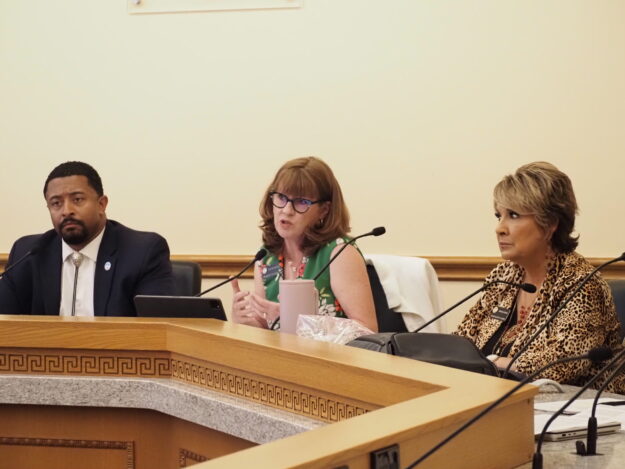Widgetized Section
Go to Admin » Appearance » Widgets » and move Gabfire Widget: Social into that MastheadOverlay zone
Colorado Dems say Trump’s ‘One Big, Beautiful Bill’ just blew billion-dollar hole in state’s budget

Colorado Senate President James Coleman, left, House Speaker Julie McCluskie, center, and House Majority Leader Monica Duran, right, speak to governor’s office analysts during a meeting of the Executive Committee of the Legislative Council on Wednesday at the Colorado Capitol in Denver (Delilah Brumer/Colorado Newsline).
Colorado will take an estimated $1.2 billion tax revenue hit in the current fiscal year due to changes that were passed in the federal Republican tax break and spending cut law, analysts warned state lawmakers Wednesday.
That lost revenue means Colorado lawmakers will need to make significant cuts — potentially through a special legislative session — to fix the budget, which faces an almost $1 billion deficit.
“This is more money in lost revenue in the current year than we lost for the first year of the Great Recession,” said Mark Ferrandino, executive director of the governor’s Office of State Planning and Budgeting. “Every day that we wait to take action, to make decisions, we are making it harder to solve the problem.”
During a presentation at the state Capitol in Denver to the Executive Committee of the Legislative Council, Ferrandino attributed the revenue shortfalls to several tax cuts in the new federal law, which President Donald Trump signed on July 4. Included in the law are provisions that reduce taxes for corporations, change the deductions that taxpayers can file and temporarily eliminate taxes on overtime and tips.
Colorado will be hit especially hard compared to most other states due to its policy of automatically instituting most federal tax code changes at the state level, Ferrandino said.
“I’m really struck by this,” said state House Speaker Julie McCluskie, a Dillon Democrat. “I’m particularly shocked that our congressional delegation would have voted for a bill that has this kind of impact to us.”
All four Republican members of the Colorado delegation to the U.S. House voted in favor of the measure. All four Democrats, as well as Colorado’s two Democratic U.S. senators, voted against it.
The predicted $1.2 billion loss is worse for the budget than the $600 million tax revenue loss forecast by state economists in June. The current fiscal year started on July 1, and the year’s budget was passed in April at $44 billion.
“This is different than, we’re just slowing our growth,” Ferrandino said. “This is, we don’t have the money to pay our bills. So we need to do something.”
With lawmakers facing tough decisions on where to make the cuts necessary to close the budget gap, they could tap into the state’s reserve. Colorado law requires that the state have a reserve that is at least 15% of its general fund spending.
But Ferrandino cautioned that overreliance on the reserve could worsen the state’s budget woes, especially in the event of a recession. He said that if the reserve were to be used to fix this year’s budget hole, it would drop to 9%.
Colorado Senate Minority Leader Cleave Simpson, an Alamosa Republican, questioned whether the revenue losses are “just compounding the structural deficit that this body has been aware of for several years, that Colorado was on a pattern of spending that could not be supported by revenue streams.”
Ferrandino responded by saying, “What we’re talking about here is a one-year significant revenue loss. That’s different than where we are long-term with the structural issues.”
The predicted tax revenue shortfall comes months after lawmakers passed the existing state budget, which made up a $1.2 billion hole that was caused largely by ballooning costs for Medicaid and other state programs.
These challenges are compounded by provisions in the new Republican law that reduce federal funding and create more administrative burden for the state agencies in charge of running Medicaid and the Supplemental Nutrition Assistance Program. The provisions include new mandatory work requirements for some Medicaid recipients and increased dollar matching requirements for SNAP.
The Medicaid changes mean that more than 150,000 Coloradans are estimated to lose health coverage, said Rachel Reiter, a director at the Colorado Department of Health Care Policy and Financing, during the presentation. Over the next eight years, about 377,000 Coloradans are at risk of being disenrolled from Medicaid due to eligibility changes and procedural hurdles, she added.
“There’s a lot of uncertainty, there’s a lot of fear, and we’re trying the best we can to communicate what we know and notice those folks in advance as much as we can,” Reiter said.
Editor’s note: This story first appeared on Colorado Newsline, which is part of States Newsroom, a nonprofit news network supported by grants and a coalition of donors as a 501c(3) public charity. Colorado Newsline maintains editorial independence. Contact Editor Quentin Young for questions: info@coloradonewsline.com.
Delilah Brumer
Latest posts by Delilah Brumer (see all)
- Colorado Dems say Trump’s ‘One Big, Beautiful Bill’ just blew billion-dollar hole in state’s budget - July 31, 2025
- One Big Beautiful Bill ‘exacerbates climate crisis’ on public lands, conservationists claim - July 27, 2025
- Colorado after-school, mental health funds frozen by Trump’s education department - July 3, 2025


